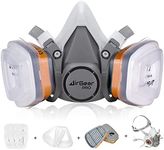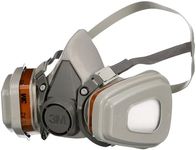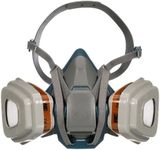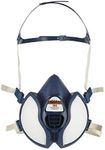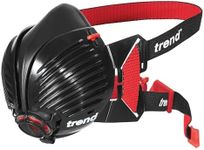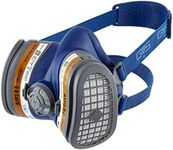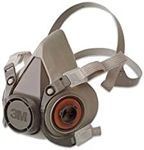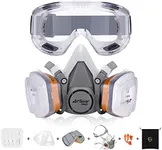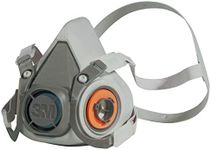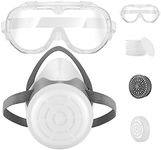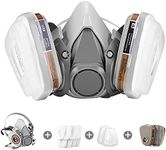Buying Guide for the Best Spray Paint Respirator Mask
When selecting a spray paint respirator mask, it's crucial to prioritize safety and comfort. The right mask will protect you from inhaling harmful fumes and particles while ensuring you can work comfortably for extended periods. Consider the environment in which you'll be using the mask, the types of paint and chemicals you'll be exposed to, and how often you'll need to use it. A well-chosen respirator mask can significantly reduce health risks and improve your overall painting experience.Filter TypeThe filter type is a critical component of a respirator mask as it determines the level of protection against various particles and fumes. Filters are generally categorized into particulate filters and gas/vapor filters. Particulate filters are suitable for dust and non-oily particles, while gas/vapor filters are designed to protect against specific chemical vapors. Some masks offer combination filters for broader protection. Choose a filter type based on the specific hazards you'll encounter, such as organic vapors from spray paints.
Fit and SizeFit and size are essential for ensuring the mask provides an effective seal against your face, preventing harmful substances from leaking in. Masks come in different sizes, and some offer adjustable straps for a more customized fit. A mask that fits well will be comfortable to wear for longer periods and provide better protection. To find the right fit, consider trying on different sizes and adjusting the straps to ensure a snug, secure fit without discomfort.
Comfort and BreathabilityComfort and breathability are important for prolonged use, as a mask that is uncomfortable or difficult to breathe through can lead to fatigue and reduced effectiveness. Look for masks with features like soft face seals, lightweight materials, and exhalation valves that help reduce heat and moisture build-up. If you plan to wear the mask for extended periods, prioritize comfort and breathability to ensure you can work efficiently without frequent breaks.
Durability and MaintenanceDurability and maintenance are factors that affect the longevity and performance of a respirator mask. Some masks are designed for single use, while others are reusable with replaceable filters. Reusable masks are generally more durable and cost-effective in the long run. Consider how often you'll use the mask and whether you're willing to perform regular maintenance, such as cleaning and replacing filters, to keep it in good working condition.
Certification and StandardsCertification and standards ensure that a respirator mask meets specific safety and performance criteria. Look for masks that comply with recognized standards, such as NIOSH (National Institute for Occupational Safety and Health) in the U.S. or CE marking in Europe. These certifications indicate that the mask has been tested and approved for effectiveness in protecting against certain hazards. Choosing a certified mask provides assurance of its protective capabilities.
